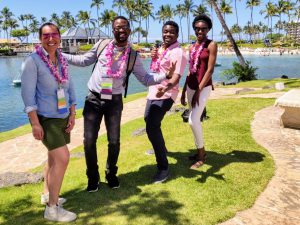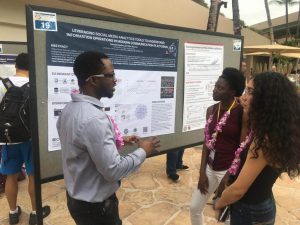Ph.D. candidate Adewale (Wale) Obadimu participated in the 2019 CRA URMD Grad Cohort Workshop which took place March 22-23, 2019 in Waikoloa, Hawaii. The two-day event was hosted by the Computing Research Association (CRA), an organization dedicated to bringing industry, government and academia together to support research and advanced education in computing.

This year, the CRA Grad Cohort for Underrepresented Minorities and Persons with Disabilities (URMD) Workshop attracted twice the amount of participants than the inaugural workshop in 2018. CRA covered the travel expenses for all selected students that collectively represent a diverse set of computing-related research areas and institutions. 158 accepted applicants from 78 top tier institutions across the United States and Canada came together to learn from one another leaving not only with more knowledge, but also a greater professional network.
While attending the two-day workshop, Wale interacted and learned from senior computing researchers and professionals, who provided him with valuable insight about the field of computing research, academia, industry and their personal experiences. Experienced researchers and professionals offered their advice during formal presentation, informational discussions and social events. This advice will not only assist Wale throughout his doctoral studies at UA Little Rock, but beyond. “This workshop provided an amazing opportunity to meet people at the forefront of computer technology and innovation,” Wale stated.

During the outdoor poster session, Wale presented “Leveraging Social Media Analytics Tools to Understand Information Operations in Modern Communication Platforms.” He and co-author Dr. Nitin Agarwal leveraged Blogtrackers to track information actors and narratives as disinformation is circulated through Online Social Networks (OSNs). The researchers used the example of the European Union (EU) migrant crisis to showcase how Blogtrackers can conduct sentiment analysis, characterize bloggers via posting trends, and extract entity networks and blogger networks.
Wale did not only discuss his research with other participants, but also listened to speakers as they discussed a variety of topics relevant to graduate students. These topics included advice on how to find a research topic and interdisciplinary research, balancing both graduate school and personal life, building resiliency, overcoming failure, and Industry vs. Academic research positions. While soaking in a wealth of information, Wale also enjoyed networking and meeting other graduate students.
